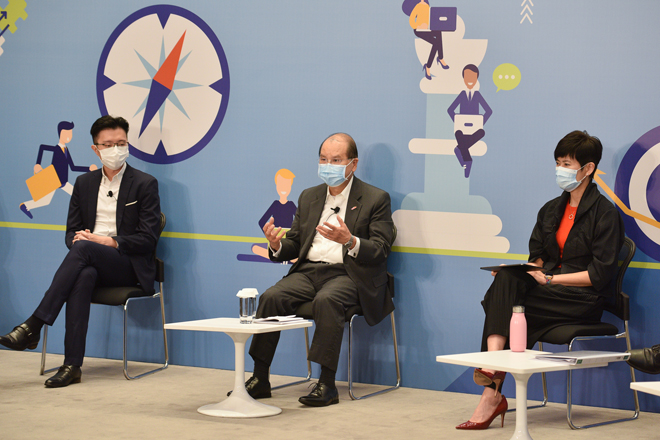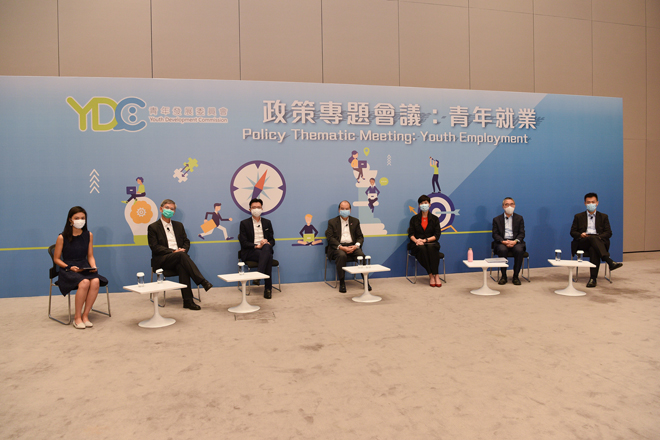Build twin city economy and strong co-operation
Enable youths to grasp opportunities
25 October 2020

|

|
With a per capita GDP of over US$23,000, the Guangdong-Hong Kong-Macao Greater Bay Area (GBA) is one of the regions with the highest degree of openness and the strongest economic vitality in the country. Its level of economic development is significantly higher than that of other major city clusters (including the Yangtze River Delta and the Beijing-Tianjin-Hebei city clusters) on the Mainland. As a unique and diversified economic entity, the GBA has great strengths in terms of population, economic scale and resources. With a GDP of US$1.6 trillion, it is expected to overtake New York Bay Area and Tokyo Bay Area in economic scale in the near future to become the largest bay area in the world.
Standing at this new starting point in history, Hong Kong should keep abreast of the times to take up new responsibilities and missions for better integration into the national development by capitalising on its unique advantages under "One Country, Two Systems" and seizing the opportunities.
Twin city economy and strong co-operation
The rapid development of Shenzhen in economy, innovation and technology in recent years has spurred discussions on how Hong Kong and Shenzhen compare with each other.
According to the "Outline Development Plan for the Guangdong-Hong Kong-Macao Greater Bay Area" promulgated by the Central People’s Government last February, Hong Kong and Shenzhen, being two of the four core cities of the GBA, are the core engines for regional development. It cannot be overemphasized that Hong Kong and Shenzhen each have their own advantages and can complement each other to achieve a win-win situation through collaboration. As an international financial centre, Hong Kong is hosting the largest offshore Renminbi bond market as well as playing the role of an international asset management centre and a risk management centre. By promoting the development of high-end and high value-added financial and professional services to enhance its attractiveness and competitive advantages, Hong Kong can continue to attract foreign investment into the country on one hand, and help the country’s enterprises to go global on the other. With the Shenzhen Stock Exchange being one of the two largest stock exchanges in the Mainland, the continuous enhancement of "Shenzhen-Hong Kong Stock Connect" and "Bond Connect" will enable Hong Kong and Shenzhen to leverage their complementary advantages to play a greater role in the financial market. Besides, Hong Kong has all along been Shenzhen’s largest source of external capital (with its cumulative investment accounting for nearly 80% of Shenzhen’s foreign investment) and largest export destination (accounting for nearly 40% of Shenzhen’s total export volume). The economic interaction between the two cities will lend essential impetus to their economic prosperity, while their strong co-operation will bring about the building of a "twin city economy" conducive to the development of the GBA.
Youth integration into national development
In his keynote speech delivered on October 14 this year to mark the 40th anniversary of the establishment of the Shenzhen Special Economic Zone, President Xi Jinping stressed the importance of fully utilising major co-operation platforms among Guangdong, Hong Kong and Macao to attract more young people from Hong Kong and Macao to study, work and live on the Mainland, so as to facilitate wider exchanges and deeper integration among the youths in these regions, thereby strengthening their sense of belonging to the motherland.
It goes without saying that young people should be helped to enrich their understanding of the country and integrate into its development. Over the past two years, the Youth Development Commission (YDC) has made ongoing efforts to enhance and extend the scope of various schemes for youth internship, entrepreneurship and exchange on the Mainland, providing intensified and diversified opportunities for Hong Kong young people to set foot in the GBA as well as other provinces and municipalities on the Mainland. Participants will gain first-hand experience of local cultures and have dynamic interaction with local youths. At present, there are on average over 60 000 Hong Kong young people and students participating in Mainland exchange and internship schemes which are organised, funded or co-ordinated by government bureaux/departments each year.
Youth internship in the Mainland
Since 2017, the HKSAR Government has organised the "Thematic Youth Internship Programmes to the Mainland" in collaboration with first-rate cultural and scientific research institutions such as the Palace Museum, the Chinese Academy of Sciences and the Wolong National Nature Reserve in Sichuan to provide unique, in-depth and valuable internship opportunities for Hong Kong youths to gain a better understanding of their respective disciplines and professional fields as well as the national development. These programmes have been widely acclaimed. With the proactive support of the concerned units, municipalities and provinces, the number of thematic internship projects has increased from two in 2017 to seven last year, offering quality internship placements.
We also provide internship opportunities in various municipalities and provinces for 4 000 Hong Kong youths every year via funding schemes and corporate summer internship schemes. As one of the key initiatives of Guangdong-Hong Kong co-operation, the Guangdong-Hong Kong Internship Programme under the Funding Scheme for Youth Internship on the Mainland has been extended to cover all Mainland cities of the GBA since last year, providing internship opportunities for about 950 young people. Upon gaining a deeper understanding of the Mainland labour market, work culture and career prospects, participants may set their own career goals, acquire work experience and establish interpersonal networks to support their future career development in the GBA.
Youth Innovation and Entrepreneurship
In recent years, the HKSAR Government has made concerted efforts with various sectors of the community to provide strong support for youth innovation and entrepreneurship. A number of funding schemes have been successfully implemented to benefit the young people by meeting their capital needs. Among these schemes, the YDC’s Youth Development Fund (the Fund) has supported the development of many start-ups, some of which have won outstanding awards with their innovations. Some youth entrepreneurs have won the World Summit Awards, and some of them have even found a foothold in the GBA market and extended the coverage of their businesses.
We will enhance our assistance to Hong Kong youth entrepreneurs to enable them to explore the opportunities brought by the development of GBA. New funding schemes have been introduced to encourage young people to make good use of the innovative and entrepreneurial bases in GBA, with a view to expanding their businesses in Hong Kong as well as the Mainland cities of GBA. The Fund will allocate over $100 million to subsidise more than 10 non-governmental organisations (NGOs) in organising youth start-up programmes which will provide capital for about 200 youth entrepreneurship teams as well as more relevant start-up support and incubation services for over 4 000 young people to realise their potential for innovation and entrepreneurship in GBA.
Moreover, an Alliance of Hong Kong Youth Innovative and Entrepreneurial Bases in the Greater Bay Area will be established. Organisations from Guangdong and Hong Kong with strength and proven track record, such as innovative and entrepreneurial bases, universities, NGOs, scientific research institutes, professional bodies, venture funds, etc. will be invited to join the alliance and jointly set up a one-stop information, publicity and exchange platform to support Hong Kong youth entrepreneurs in GBA.
Youth exchanges in the Mainland
The Government is committed to helping young people broaden their horizons. Last year, the YDC subsidised around 18 000 youths to participate in various exchange activities in 31 Mainland provinces and municipalities. With different themes covering culture, technological development, history, voluntary work and physical education, these activities have effectively enhanced young people’s knowledge and understanding of national development and enabled their in-depth exchanges with Mainland youths, thereby strengthening their sense of national identity.
Besides, the Home Affairs Bureau organises the Service Corps programme to give Hong Kong young people an opportunity to take part in teaching service for one semester or even a whole school year in primary schools in the urban and rural areas of the Mainland. Not only does the programme enable participants to have long and in-depth exchanges with Mainland people, it also inspires their commitment to serving others and contributing to the country. I encourage eligible young people to actively consider enrolling in the programme, now in its 10th edition, when it is open for recruitment. I also appeal to large enterprises for their support of this meaningful project by allowing some of their enthusiastic young employees to join in order to contribute to promoting the country’s urban and rural development.
Conclusion
Hong Kong’s integration into the national development is not meant to "mainlandise" or "marginalise" the city. Rather, it is to enable Hong Kong to continue to capitalise on its unique advantages under "One Country, Two Systems". Hong Kong is a metropolis with an international language environment, young people brought up here are biliterate, trilingual and well versed in Chinese and Western cultures. They also have broad international horizons which give them a competitive edge in the GBA. I encourage them to learn for themselves the country’s development and its opportunities; adopt an attitude of openness, accommodation and healthy competition at all times; strive to enhance their strengths to add value to themselves; and enrich their experience, so that they can make good use of their potential in the broad platform of the GBA. In short, the GBA provides Hong Kong young people with a new pathway for employment and career development, offering them one more option in life.

